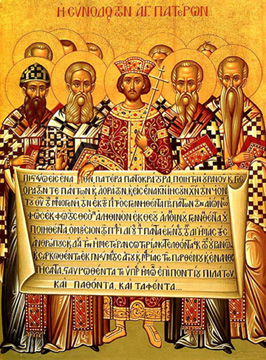Nicene Creed
Nicene Creed

The term "Creed" used to mean 'I engage'. It was supposed to be a personal profession of your deeply held opinion which provoke you to action. Any official creed of the the Holy Church established by Jesus the Christ should consist only of the words of Christ and the Doctrines of Jesus since the Church was "founded and established by Jesus Christ, to receive, preserve, and propagate his doctrines and ordinances" and He granted no authority to exercise control over the faith of the people. The Holy Spirit is to be our guide and comforter.
Where did God grant the right of anyone the authority[1] to impose their opinion on anyone else?
Alexander of Alexandria sought to excommunicate Eusebius as a heretic until Eusebius submitted and agreed to the Nicene Creed at the First Council of Nicea in 325.
The original
The original Nicene Creed was first adopted in 325 at the First Council of Nicaea. At that time, the text ended with the words "We believe in the Holy Spirit", after which various anathemas against Arian propositions were added.
The Second Ecumenical Council held in Constantinople in 381 as a modification of the original Nicene Creed of 325 produced the "Niceno-Constantinopolitan Creed" or the "Nicene-Constantinopolitan Creed". It also came to be very commonly known simply as the "Nicene Creed". It is the only authoritative ecumenical statement of the Christian faith accepted by the Roman Catholic, Eastern Orthodox, Oriental Orthodox, Anglican, and the major Protestant denominations.
The Creed of the Apostles and Athanasian creeds are not as widely accepted. The Apostles' Creed makes no explicit statements about the divinity of the Son and the Holy Spirit, but, in the view of many who use it, the doctrine is implicit in it.
What about the creed?
Who is to define and explain it?
Is not agreeing on how it is applied an important thing?
We believe that agreeing as to the meaning of the creed is dependent on agreeing with Christ through the Doctrines of Jesus. That is a process that may require mutual rebuke and reproof amongst men and women over a long time. The agreement we seek comes in time as we seek the kingdom of God and His righteousness... The Church is a system in which you may seek the way of Christ.
Joining the Church or a Church does not make your salvation real. Dividing people over their personal opinions concerning the Doctrines of Jesus vs the doctrines of men seems to be against the teachings of Christ. It is joining with Christ in spirit and in truth that we must seek. The Church should never come between the spiritual engagement of that connection to the Holy Spirit sent by Christ through faith.
Religion |
Pure Religion |
Private welfare |
Fleeing Religion |
False religion |
Public religion |
Our Religion |
Christian conflict |
Corban |
Baptism |
Benefactors |
That Word |
Daily ministration |
Modern Christians |
Diocletianic Persecution |
Christians check list |
gods |
Judge not |
Judge |
Fathers |
Deist |
Damnable heresies |
Factions at the altar |
Pharisees |
Sadducees |
Zealot |
Essenes |
Levites |
Messianic Judaism |
Menahem the Essene |
Sanhedrin |
Altars |
Clay and Stone |
Red Heifer |
Golden calf |
Freewill offerings |
Religion |
Pure Religion |
Public religion |
Christian conflict |
Paganism |
Denominations |
Dispensationalism |
Benefactors |
Corban |
Daily ministration |
Calendars |
Cult |
Imperial Cult of Rome |
Guru theories| |
Covet |
Merchandise |
Mark of God |
Mark of Cain |
Mark of the Beast |
Nature of the Beast
Section 666 |
Benefactors |
Biting one another |
Cry out |
Worship |
Church |
Temples |
Religious Orders |
Priests |
Kings and priests |
Hear |
Bible Index |
Network |
If you need help:
- Or want to help others:
Join The Living Network of The Companies of Ten
The Living Network |
Join Local group |
About |
Purpose |
Guidelines |
Network Removal
Contact Minister |
Fractal Network |
Audacity of Hope |
Network Links
HHC Creed http://www.hisholychurch.org/creed.php
Creeds and Conclusions http://www.hisholychurch.org/creed2.php
Creed notes in PDF. http://www.hisholychurch.org/creednotes.pdf
Hebrews 11:6 But without faith [it is] impossible to please [him]: for he that cometh to God must believe that he is, and [that] he is a rewarder of them that diligently seek him.
Footnotes
- ↑
- Matthew 20:25 "But Jesus called them unto him, and said, Ye know that the princes of the Gentiles exercise dominion over them, and they that are great exercise authority upon them. But it shall not be so among you:..."
- Mark 10:42 "But Jesus called them to him, and saith unto them, Ye know that they which are accounted to rule over the Gentiles exercise lordship over them; and their great ones exercise authority upon them. But ye shall not be so:..."
- Luke 22:25 "And he said unto them, The kings of the Gentiles exercise lordship over them; and they that exercise authority upon them are called benefactors. But ye [shall] not [be] so:..."